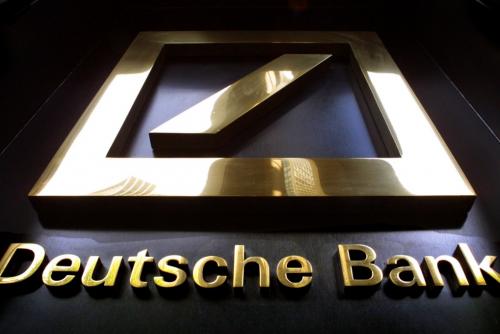The banks too big to fail (TBTF) in 2019 and Deutsche Bank
In the context of the post-financial crisis of 2008, it became evident that banks moved away from their conventional business turn.
- Análisis

The international financial crisis of 2008 generated losses that severely impacted the level of capitalization of banks. The result was the adjustment of strategies in the business models of these financial institutions, since the adoption of the Dodd-Frank Law, and its similar in Europe and Japan, during the first post-crisis period, decreased their profitability.
In the context of the post-financial crisis of 2008, it became evident that banks moved away from their conventional business turn. The lowering of interest rates to revive the more developed economies led to the loss of profitability of bank lending. Thus, they opted for speculation in the stock market, the exchange market, commodities, interest rates, as well as other less licit activities, such as asset laundering and assistance in tax avoidance, in their new business models.
TABLE 1. THE WORLD'S BIGGEST BANKS 2008 | ||||
Rank | Name | Country | Fiscal Year | Total Assets ($b) |
1 | Royal Bank of Scotland Group | United Kingdom | 12/2007 | 3,807 |
2 | Deutsche Bank | Germany | 12/2007 | 2,974 |
3 | BNP Paribas | France | 12/2007 | 2,494 |
4 | Barclays | United Kingdom | 12/2007 | 2,459 |
5 | HSBC | United Kingdom | 12/2007 | 2,354 |
6 | Crédit Agricole | France | 12/2007 | 2,268 |
7 | Citi | United States | 12/2007 | 2,188 |
8 | UBS | Switzerland | 12/2007 | 2,019 |
9 | Bank of America | United States | 12/2007 | 1,716 |
10 | Société Générale | France | 12/2007 | 1,578 |
Deutsche Bank, in 2008 was the second largest bank in the world by financial assets seize. In 2019, this bank, too big to fail, had committed so many faults and paid so much in fines in the United States and Great Britain that it was faced with the reality that is not profitable. Being TBTF the decision of the German government, which decided not to rescue it, was that it be cut up and that the different parts be sold or closed. In 2016 alone, Deutsche Bank was fined 23.5
| Price of Deutsche Bank shares 2007-2019 |
billion dollars for various violations such as manipulation of Libor rates, balance sheets, and concealment of losses, violation of economic embargo, tax evasion by taxpayers, use of garbage mortgages, disclosure of non-public information (see Ugarteche and Zaldivar, Gran banca = ¿crímen organizado?, www.obela.org, October 18, 2016).
The 10 titans of global banking in 2008 were European and American (see table 1). In 2019, this list is headed by four Chinese banks, followed by four from the US as shown in table 2. There is one British bank, one Japanese bank and there are no French, Swiss or Germans.
The change in the world economic order in the last decade has concentrated supply chains and technological innovation leadership in China, resulting in China influencing global standards. The change in financial supremacy is a reflection of the new world order.
China's banks are expanding internationally both through the opening of yuan windows with correspondent banks, and the opening of branches, and through the purchase of bankrupt banks in countries of interest to them. China Construction Bank, an agency in Chile, opened in June 2016. The Industrial and Commercial Bank of China ICBC has branches in Argentina, Brazil, Peru and Mexico. In 2011, ICBC acquired 80% of Standard Bank in Argentina. The Bank of China operates in Panama, and the ICBC is about to open.
Table 1: The biggest banks in the world
(Source: The Banker 2019)
The U.S. banking system, rescued in full 2008 by the banker made secretary of the Treasury Paulson, with an injection of $700 billion dollars to nine banks, continue to record solid growth in loans and profits, unlike European banking. It should be remembered that the U.S. financial complex spends 1.2 million dollars a day lobbying Congress in Washington to obtain legislation in its favor (444 million USD annually in 2018 in https://www.opensecrets.org/lobby/top.php?showYear=2018&indexType=i seen August 6, 2019).
Finally, although American banks are backed by favourable legislation and have higher profitability than Europeans, both are surpassed by Chinese banks which are more dynamic and do not carry the burden of the 2008 crisis nor of the hidden heavy portfolios which, in some cases, have lasted a long time. As in mystery novels, the truth always emerges, as DB has shown, and the world's second largest bank is now almost bankrupt. The good news is that there was no global chaos because of the sensible action of the Merkel government to order its dismemberment. No one is TBTF.
- Oscar Ugarteche is a senior researcher IIEC UNAM, SNI/CONACYT, coordinator Observatorio Económico de América latina www.OBELA.org.
- Larry Vargas, Faculty of Economics BUAP, Member of the Observatorio Económico de América latina.
Del mismo autor
- El multilateralismo bipolar 08/03/2022
- Bipolar multilateralism 07/03/2022
- What does 2022 bring? Uncertainty 31/01/2022
- ¿Qué trae el 2022? Incertidumbre 31/01/2022
- The most expensive Christmas of the century... (so far) 20/01/2022
- La navidad más cara del siglo (hasta ahora) 20/01/2022
- Lo que pasó en el 2021 10/01/2022
- What happened in 2021 10/01/2022
- Estados Unidos: el elefante en la habitación 08/11/2021
- The elephant in the room 07/11/2021








